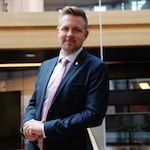
Financing Clean Energy as boon to the Economy
We might very well be in the beginning of something that will fundamentally change our
economy for the future.
The industrialization was to a large extent made possible by the access to fossil energy.
It powered the factories and the transport infrastructure needed to deliver materials to the factories and products from them.
We are now at the beginning of a period where we will change the energy needed for our economy from fossil to renewable.
A change which will bring big opportunities for Europe in creating new jobs and be more energy independent, but it will also create challenges for workers and societies alike when we are transitioning to the post fossil era.
During just the last years the cost for investing in renewable energy has rapidly decreased making it more viable not only for big energy companies but also for small businesses and consumers which now have the possibility to also become energy producers.
Solar panels on the roof or perhaps a small wind mill on the farm together with bigger wind project both on shore and at sea.
We see how production processes become better at using production generated waste to also produce on site energy, which we can see in many paper mills and biorefineries.
Innovation and people seeing opportunities in being part of the energy system is the very foundation for the financing of the needed transition towards renewable energy that we now see.
Besides the merely market driven signals we now have a Paris Agreement in place that will require a lot more renewable energy in order to be able to meet the goals set.
The EU is more or less finalizing the climate legislations for post 2020 and we are half way through the negotiations on the clean energy package.
For Europe all these pieces of legislation are crucial and much more important than any public investment fund or public support scheme. These set the regulatory foundation for all the investments that will come in renewable energy.
For Sweden we have several projects that is now on hold waiting for what rules that will govern their investments. If we are not managing to create a system of rules that can give stability and regulatory security no amount of public money can mitigate that.
Are you investing billions of euro in a renewable energy installation you really need to be able to calculate that the investment will pay off in the end.
Will we not be able, in the EU, to deliver long-term stability for investments we are deliberately delaying this much needed transition away from fossil fuels and the only ones that will be happy about that is the ones that still want to make money out of a fossil dependent economy.
At the moment the EU has big opportunities to develop more renewable energy and be the global leader,
but if we do not manage to set the regulatory scene for this others will soon take the leading role instead.
Globally investments in renewables is the future and in many places we see more and more pressing needs to change the energy system. In China clean energy is needed in order to get cleaner air in the cities. In many developing economies smaller scale renewable installations can be a better way to get the needed energy instead of building a big plant with big costs in building up a grid system.
We, the EU, cannot afford to miss this chance to lead in the development of renewable energy. Leading this transition is not only about being the world climate leader it is also about providing more and new green jobs to Europe, in all fields from development to production.
Because the transition from fossil to renewable will unavoidably also be a challenge for workers and communities dependent on the jobs provided by the fossil fuel sector.
Providing new jobs and future opportunities for those who, initially, will not personally benefit from the shift to renewable energy will be a component in the work for the years to come this will put pressure on our labor markets, education systems but it will also need political leadership.
A leadership which is clear on the direction we are taking for the future, but also has a plan for all society on how to get there.
Me myself, I am not claiming to be that political leader with the great plan. But I am a politician which sees all the opportunities that a green economy powered by renewable energy can give.
But if this green economy shall be a success we all need to work together. Politicians from all fields with society and business. If we do that I am convicted that this will be a success.
To start I think one of the best gift we politicians can give in terms of financing clean energy is regulatory certainty and long term stability.
Something that will be a win both for the EU Member States budgets and the ones planning big investments.
So let’s start there and let that be the guiding principle for the work on the clean energy package.




